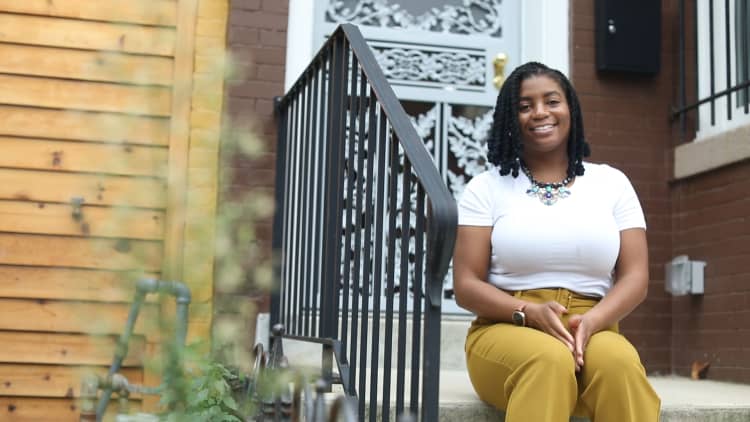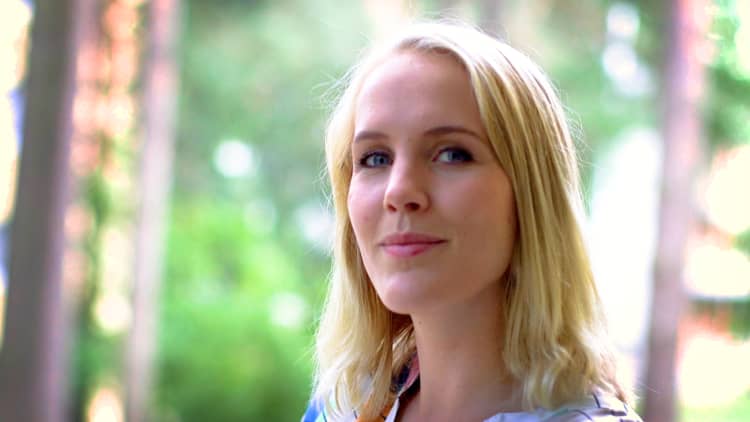This story is part of CNBC Make It's Millennial Money series, which profiles people around the world and details how they earn, spend and save their money.
Maria Ainamo-McDonald bought her first apartment in Helsinki, Finland, at 26. She recently sold it, came out $21,000* ahead and used the profits to upgrade to a bigger home that she shares with her husband, Duke, and their two-year-old son.
It was a significant purchase: The four-bedroom apartment cost $326,000 all-in. The couple put $78,000 down, financed the rest and split the $932 monthly mortgage payment, which includes interest.
It's worth it to own, the 30-year-old earning $48,000 a year tells CNBC Make It. "I see buying an apartment as an investment, especially if you buy it in a city where the prices are going up all the time."
Plus, she plans on staying put for a while. "I was born in Helsinki," she says. "And I've always liked Helsinki."
You can't beat the health-care system and parental leave policy, she adds. "In my humble opinion, Finland is the best place to have kids."
I see buying an apartment as an investment, especially if you buy it in a city where the prices are going up all the time.Maria Ainamo-McDonald
It's also the happiest country, according to the 2019 World Happiness Report. Aianamo-McDonald agrees with the assessment. "Everything is very good in this country: Everybody has food and shelter and free education, which I think is the key. You have the possibility of being very happy here — then, of course, it's up to the individual to decide if they want to grab that chance."
What she earns
Ainamo-McDonald makes $48,000 a year working as a marketing specialist at the broadcasting company YLE, where she's been for the past seven years. She started as an intern, earning about $1,665 a month, and her first full-time salary was $3,200 a month. Today, it's about $4,000.
"We talk about our salary in terms of how much we make a month — not how much we make per year," she explains. "In Finland, everybody gets paid once a month."
She's lives comfortably on $48,000, but in an ideal world, would make closer to $75,000. She picked that amount after reading studies that suggest you need about that much to be happy. While it's a goal in the back of her mind, "I don't actively work for that to happen," she adds. "I don't do my work because of money. I do my work because I enjoy it."
What she spends
Here's a breakdown of how Ainamo-McDonald saves and spends in a typical month.
Food: $638
Ainamo-McDonald spends about $527 per month on groceries, including diapers, for the whole family.
She also spends an additional $111 eating out. That's enough to cover just one night out for the family at a nice restaurant. "In Finland, going out for dinner is super expensive, especially if you want to have alcohol," she says.
She gets lunch at work every day. It costs about $8 and is taken straight out of her paycheck.
Mortgage: $466
Ainamo-McDonald and her husband split their mortgage down the middle and pay $466 each every month.
She set up automatic payments so she never has to think about it. "I've organized everything with the bank so that when my salary comes on the 23rd, my mortgage goes right away from that," she says.
Child care: $372
Finland subsidizes child care, and Ainamo-McDonald pays just $372 a month for private day care. It includes breakfast, lunch and a snack for her son, Luka, who has been going since he was a year old.
Affordable child care is one of the reasons she says that Finland is the best place to have a family. Not to mention, when you give birth, it's almost free. "We stayed in the hospital for three full days as a family. We had our own family room, and we got meals and support — and the bill was about $330 total."
Finland also has a generous national maternity leave policy. "You get about three months with full salary," she says. "And then six months with 75% salary. Even after nine months, you still have a possibility to stay home if you want, but then you get about $555 a month."
Savings: $222
Ainamo-McDonald invests $222 per month in a balanced fund.
She started investing a year and a half ago after reading a money blog that explained how consistently setting aside €200 a month could eventually grow to become about €500,000 over time, which is about how much she'd like to have saved by retirement.
Transportation: $100
The unlimited bus and train city pass costs Ainamo-McDonald $45. She also spends about $55 on gas for the car she and her husband share.
Donations: $81
Ainamo-McDonald donates $22 a month to Save the Children and $22 to the World Wildlife Fund (WWF). She also sponsors a child in Zimbabwe, which is about $444 a year to support her education and pay for her school supplies.
"I was privileged enough to be born in Finland," she says. "Since I don't have to worry about my health care or ever being hungry, I think it's really important that I help others."
Since I don't have to worry about my health care or ever being hungry, I think it's really important that I help others.Maria Ainamo-McDonald
Student loans: $67
"In Finland, you don't pay anything for university," she explains. You even get money from the government, about $555 a month as a student. Students will still take out loans to pay for food, housing and travel because the loans are incredibly cheap.
Ainamo-McDonald worked while she was studying, so she didn't necessarily need money to support herself, but she decided to take out loans anyway to save for her first apartment. In Finland, she explains, if you save 10% of the price of the home in a specific government-supported account, the government guarantees your loan from the bank.
"I took out student loans, and put it in that account, so that by the time I stopped my studies, I would have the 10% to buy the house without my parents having to be there to guarantee my loan."
She took out $7,210 total and is currently paying the loan down. She pays $67 a month, which includes interest. Her interest rate is 0.33%.
Health insurance: $11
"I basically don't pay anything on my health care," says Ainamo-McDonald, and that's standard in Finland. "Of course, when I pay taxes, some of that money will go to the health-care section," she adds.
She technically doesn't have to pay anything at all — the $11 a month is additional coverage, she explains. "When I took my bank loan, they kind of sold me this insurance: If I get diagnosed with a very serious illness or something, then I get like $33,000 in my bank account. But that's an extra thing."
Everything else: $353
- Utilities: $258 (for water, electricity and a maintenance fee)
- Subscriptions: $67 (for her basketball league and Netflix)
- Phone bill: $17
- Dog: $11
Buying an apartment in Helsinki
Ainamo-McDonald has always wanted to own. "I hate paying rent," she says. "When I pay rent, I feel like I'm just like throwing money away every month."
She bought her first place, a 720-square-foot, two-bedroom apartment, in 2015 for around $194,000. After selling it earlier this year, she came out about $21,000 ahead. Plus, she built more than $70,000 in equity that she used toward a down payment on her new apartment, a 947-square-foot four-bedroom that she and Duke bought for $326,000. They have about $231,900 left on the loan.
Managing finances as a couple
Ainamo-McDonald and her husband split some of their costs straight down the middle, like their mortgage and maintenance fees, but not all of them. She pays for groceries, day care and gas, while he makes the car payment and covers car insurance and Wi-Fi. She pays for Netflix, while Duke pays for HBO and Spotify.
"It's basically like we share expenses, but it's not calculated," she says.
She ends up paying a little bit more each month because she's earning more. "In our case, it has always just been like, whoever has the money pays for it. When I was studying and he was working, he was paying more for rent. Now that I'm making a little bit more money, I'm paying a little bit extra."
They keep separate accounts. "I don't know if he has savings," she says, adding, "I don't think so. I don't think my husband has savings."
Their system works for them, partly because they don't feel stressed financially, she says. "We don't really fight about money, I think because we're in the fortunate situation that we're not tight on money."
What the experts say
CNBC Make It asked Finnish money blogger and podcast host Julia Thuren to comment on what Ainamo-McDonald is doing right with her money and where she could improve.
She's smart to buy instead of rent
It only makes sense to buy an apartment in the biggest cities in Finland, says Thuren. That includes Helsinki, where "the value of apartments is going up really quickly because everyone wants to live in the city." In other areas of the country, home values aren't growing as much.
"In Helsinki, the apartments are quite expensive," she says. "You can get a studio apartment for about $222,000, so it takes a long time to save the money."
Ainamo-McDonald's strategy of taking out student loans to save for her first place is a smart and common way to get into the market, she says. "The student loans here are super cheap and super safe."
Though it's a bit of a loophole, she adds. "Some people don't like that students are doing this because the student loan should be for studying, but I think it's a wise thing to do."
She could aim for a higher salary
If Ainamo-McDonald reaches her goal of making $75,000 a year (about $6,250 per month), she would be among the top earners in the country. "The top 10% earn $5,713 per month," says Thuren, while "the most common salary in Finland is $2,884 per month."
As a marketing specialist, a $75,000 salary is "quite possible," she adds. "It's possible, even, to earn more. You can always aim higher."
She and Duke should consider opening a joint account
Their system of splitting costs "sounds quite fair," says Thuren, "but I think it's always easier to have one common account — put a certain percentage from your salary after taxes into that account" and then use the money for shared expenses, such as groceries or day care.
A joint account might prompt more conversations about money, too. The fact the Ainamo-McDonald doesn't know anything about Duke's savings habits or balance is common, she says. "People here don't talk about money that much at all." It's a taboo topic, even between couples, and "that's a problem," she says.
The more open you and your partner are about your finances, the better. "When you get a common apartment then you should definitely have the money conversations," Thuren recommends. "It makes everything so much easier."
What's your budget breakdown? Share your story with us at makeitcasting@nbcuni.com for a chance to be featured in a future installment. We are especially interested in hearing from people in Austin, Denver and Nashville.
*CNBC Make It converted Euros to USD using the OANDA conversion rate of 1 Euro to 1.10924 USD on October 29, 2019.
Don't miss: This 23-year-old has $11,000 in student debt but still lives 'comfortably' on a $50,000 salary in NYC
Like this story? Subscribe to CNBC Make It on YouTube!




